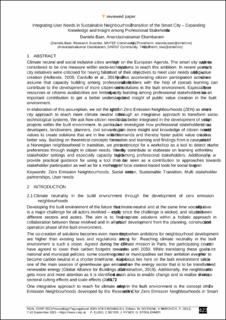Integrating User Needs in Sustainable Neighbourhood Transition of the Smart City – Expanding Knowledge and Insight among Professional Stakeholders
Chapter
Published version
Permanent lenke
https://hdl.handle.net/11250/2833500Utgivelsesdato
2021Metadata
Vis full innførselSamlinger
- Publikasjoner fra CRIStin - SINTEF AS [5801]
- SINTEF Community [2248]
Sammendrag
Climate neutral and social inclusive cities are set high on the European Agenda. The smart city approach is considered to be one measure within socio-technical systems to reach this ambition. In recent years, smart city initiatives were criticised for having fallen short of their objectives to meet user needs and public value creation (Hollands, 2008; Cardullo et al., 2019). Besides accelerating citizen participation activities, we assume that capacity building among professional stakeholders with the help of (social) learning can contribute to the development of more citizen-centred solutions in the built environment. Especially when resources or citizens availabilities are limited, capacity building among professional stakeholders can be an important contribution to get a better understanding and insight of public value creation in the built environment.
In elaboration of this assumption, we set the spotlight on Zero Emission Neighbourhoods (ZEN) as one smart city approach to reach more climate neutral cities through an integrative approach to transform sociotechnological systems. We ask how citizen needs could be better integrated in the development of smart city projects within the built environment. In particular, we investigate how professional stakeholders, such as developers, landowners, planners, civil servants can gain more insight and knowledge of citizen needs and values to create solutions that are in line with their demands and thereby foster public value creation in a better way. Building on theoretical concepts for innovation and learning and findings from a case analysis of a Norwegian neighbourhood in transition, we present a concept for a workshop as a tool to detect market preferences through insight in citizen needs. We thereby contribute to elaborate on learning within multistakeholder settings and especially capacity building among professional stakeholders. Additionally, we provide practical guidance for using a tool that can be seen as a contribution to approaches towards stakeholder participation as well as for a methodology of local context-based tools for social learning.

